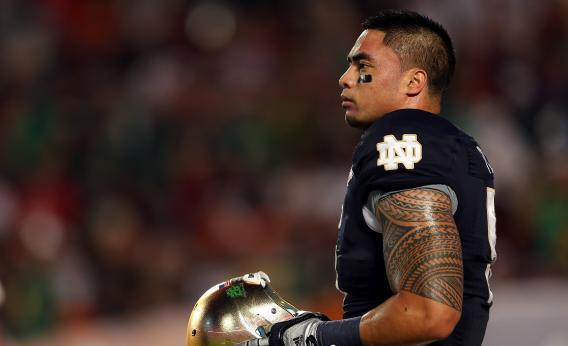With everyone still trying to make heads (he was the victim) or tails (he was in on it) out of the bizarre story of Notre Dame football star Manti Te’o’s dead girlfriend that was neither dead nor his girlfriend—nor even an actual real-life person in the first place—lots of people are throwing around the term “catfish.”
Many of you no doubt get the reference, but for those of you who haven’t heard the term before, a quick primer: Catfish was a 2010 documentary that has since been repurposed by MTV into a television show. The term “catfish” itself is used to describe someone who has created a fake social media persona through Facebook/Twitter/etc. to deceive someone—most often by seducing them online and, sometimes, later over the phone.
The movie told the story of one of its directors falling for such a hoax; the show investigates whether individual “real-life” online relationships are the real deal or whether there is something fishy going on. (I’m putting real-life in quotes because this is an MTV reality show we’re talking about.)
Here’s Slate TV critic Troy Patterson on the big- and small-screen versions in a piece from a few months ago:
A document of cruel self-delusions, an index of unusual realities, virtually a postscript to the body of Western literature about romantic love, and an extraordinarily fine opportunity to exult in the suffering of your fellow human beings, Catfish is a TV show. That is why MTV is calling it Catfish: The TV Show.
Backstory? I detect with my good ear a murmuring query after backstory, so I will direct you to the 2010 theatrical release of a feature film titled Catfish, directed by Henry Joost and Ariel Schulman. Nev Schulman, a 24-year-old photographer doing business in his native New York City, was cinematographer, star, and dupe. He received a piece of electronic fan mail and struck up a long-distance friendship with the family of a prodigiously talented child painter. His heavy Facebook flirtation with her purportedly hot, alleged 19-year-old sister led to hours of cellphone heart-to-hearts. After eight whole months of this, his bullshit meter went off, and he dropped in on these folks unannounced, with the posse of his films’ two directors. As I wrote at the time in Spin—a very fine magazine from which I have only mildly self-plagiarized the foregoing—either the filmmakers “made good use of great luck, or they’ve rigged up the art-house equivalent of train-wreck reality TV.”
There are some clever Americans—in New York and Los Angeles, among other cities where one goes to good dinner parties—who also believed that Catfish, the film, might be a hoax in itself. They did not believe the material because it was too good to be believed, and their skepticism was in itself indicative of a small handful of problems with reality and identity and truth and beauty here and now in the post-apocalypse. One of the many interesting things—one of the three or four interesting things—about Catfish: The TV Show is that its existence demonstrates how dearly Catfish skeptics overestimate the cleverness of Americans, perhaps themselves included.
